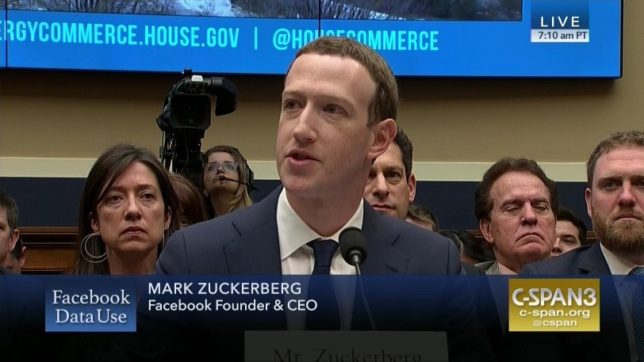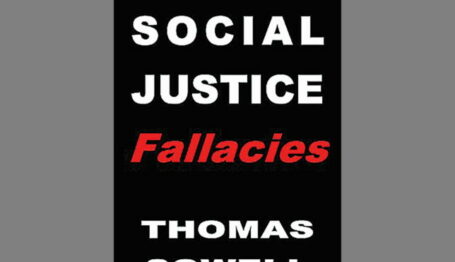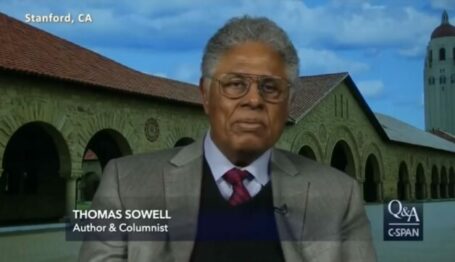Organization Trends
Addressing Big Tech Censorship: Big Tech’s Friends in Washington
 Mark Zuckerman testifying before Congress. Credit: C-SPAN.
Mark Zuckerman testifying before Congress. Credit: C-SPAN.

Addressing Big Tech Censorship (full series)
The Censorship Timeline | Purging Parler
Big Tech’s Friends in Washington
Big Tech’s Friends in Washington
Looking at the fallout Parler faced following the riots, it’s easy to wonder why a start-up was squashed while Facebook and its Big Tech peers remain unscathed. The difference between Parler and these other companies—besides several billion dollars—is that Big Tech firms have friends in high places.
Big Tech’s protection in Washington began under President Barack Obama. In 2012, staffers in Bureau of Competition at the Federal Trade Commission (FTC) delivered an extensive report to top FTC officials detailing Google’s anti-competitive behavior. The Obama appointees running the commission had the opportunity—and the evidence—to rein in Google, but they declined. The European Union hit Google with billions of dollars in fines for anti-competitive behavior, but U.S. officials allowed Google to continue to dominate the industry.
Similarly, Facebook was allowed significant growth in 2012 when the FTC declined to block a merger between Facebook and Instagram despite an unnamed executive blatantly stating that Facebook intended to buy Instagram to eliminate a competitor.
During Obama’s presidency, Google representatives had meetings in the White House on weekly basis, and the White House even requested talking points from Google while the administration was conducting an FTC investigation. Google hired more than 250 former White House employees during Obama’s tenure. And after Obama’s term ended, his staff flooded Big Tech firms. Lisa Jackson, Obama’s head of the Environmental Protection Agency, went to Apple. Jay Carney, Obama’s former press secretary, went to Amazon. Anne Wall, an Obama legislative staffer, went to Google.
Whether it was indifference or inbreeding, the Obama administration had no interest in reining in Big Tech. And despite Trump’s bluster about opposing Big Tech, he did little to stop any of these monopolistic corporations.
The tech industry knows how to keep Washington buttered up. Big Tech firms have donated $379,000 since 2016 to members of the antitrust subcommittees in both the House and the Senate.
While Big Tech keeps its friends close in Washington, that doesn’t mean Big Terms firms don’t have time to charm foreign leaders as well. Google went as far as developing a censored search engine for the Chinese government so it could remove content the Communist Party didn’t like. Google eventually pulled the plug on the project after backlash for helping a foreign government that routinely violates human rights.
What Now?
Within two decades, Facebook, Alphabet, Google, and Apple have grown more powerful than anyone could have imagined. They can control the flow of information and limit which news stories Americans see. They can kill competitive start-ups like Parler. They can silence sitting presidents and governors. And while Congress hasn’t had the stomach to address Big Tech censorship yet, rumblings are growing on both sides of the aisle about how to rein in these massive corporations.
Members of Congress are considering two strategies.
The first is to split up Big Tech using existing antitrust laws. The Obama administration may have declined to strike when it had the chance, but many lawmakers want to break up Big Tech firms into smaller, less powerful entities. This effort to break up Big Tech companies is supported by liberal lawmakers including Sen. Warren. Facebook, Google, Apple, and Amazon are all facing antitrust investigations in the United States and Europe that aim to expose any anti-competitive behaviors the companies are demonstrating.
While liberals like Warren love the idea of breaking up Big Tech, too much government interference makes some conservatives queasy.
The second method is changing how these entities operate within existing law. This could happen in two ways. The first, as proposed by Sen. Josh Hawley (R-MO), would revoke liability protections for Big Tech companies who censor certain political viewpoints.
Under Section 230 of the Communications Decency Act of 1996, service providers cannot be held liable for crimes that occur over their platforms. Verizon, for example, cannot be held liable for a threat made during a cell phone call. Similarly, Facebook and Twitter cannot currently be held liable for any criminal conduct posted on their platforms.
Section 230 protections do not apply to publishers, however. A newspaper is not protected if it chooses to publish libelous content. Hawley argues that Facebook, Google, Twitter, and others are acting as publishers by deciding to censor some content while allowing other postings. If Hawley’s proposal became law, social media platforms would have to either stop moderating political content or open themselves up to countless lawsuits.
Similarly, some conservatives have proposed that Big Tech must be considered utilities, like water or electricity. Utilities are managed by private companies, but the government has significant say over what they can charge and which customers they must serve. If social media platforms were utilities, they may not be allowed to choose which accounts to shut down.
In a recent opinion, Supreme Court Justice Clarence Thomas argued that social media platforms should be classified as common carriers. He argued online platforms are essential for free speech and noted that the government will need to address the issue of censorship in the future:
Today’s digital platforms provide avenues for historically unprecedented amounts of speech, including speech by government actors. Also unprecedented, however, is control of so much speech in the hands of a few private parties. We will soon have no choice but to address how our legal doctrines apply to highly concentrated, privately owned information infrastructure such as digital platforms.
It’s not clear which path Congress will choose, but concern over the immense power Big Tech companies have accrued over the past two decades appears to be one of the few bipartisan beliefs left in Washington.



